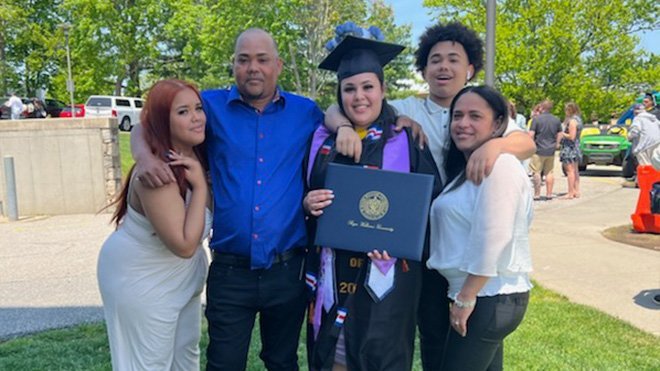First-Generation Hawks Soar with Support Program
RWU welcomes largest cohort of students to S.O.A.R. for 2022-2023 year.

When Maria Tavera ’22, a Dominican Republic native who grew up in Providence, R.I., and the first in her family to attend college, stepped onto RWU’s campus four years ago, she initially felt out of her element and had difficulty adjusting to college life.
What helped her adapt and flourish was S.O.A.R. (Strive, Overcome, Achieve, Rise), a support program for first-generation first-year students that helps them feel a sense of belonging and thrive at RWU, which Tavera said helped her find her place on campus.
“S.O.A.R. welcomed me with open arms,” said Tavera, a Legal Studies and Psychology double major who then joined RWU’s Black and Latinx Living Learning Community, Multicultural Student Union, and Africana Student Coalition. “Without S.O.A.R., I wouldn’t have had the foundation I had.”
Empowering Students to Succeed
Launched in 2018, S.O.A.R. helps first-generation students navigate their first year at RWU and empowers them with the knowledge and tools to succeed, including being paired with a faculty or staff mentor and connecting with peers who share their identities and experiences.
S.O.A.R. students arrive early on campus to meet each other, identify mentors, and “just get comfortable being in a new environment,” said Stephanie Akunvabey, RWU’s Vice President for Equity and Inclusion and Chief Diversity Officer. Throughout the academic year, the group meets monthly for workshops and to talk.
According to the Education Advisory Board, a large percentage of first-generation students nationwide are also low-income or students of color, who typically don’t have access to all the same opportunities that students whose parents attended college have and face additional challenges when they’re trying to pursue a college degree.
First-generation students make up approximately 17 percent of RWU’s undergraduate population and are growing. The fifth cohort who started in fall 2022 is the biggest yet. “We started this program to fill in gaps and help them thrive at RWU,” said Akunvabey.
Tavera’s mentor, Paola Prado, professor of Journalism & Digital Media, said S.O.A.R. is critical in helping retain students. As she watched Tavera wrestle with “creating a space and finding her own tribe on campus,” said Prado, such mentorship “speaks to the importance of having diverse faculty on campus, because she was seeing another Latina on the other side of the struggle she was going through.”
That mentorship was integral to her success, agreed Tavera, one of 12 S.O.A.R. students who graduated from the first cohort last May. “I would go to (Prado) every week and she would listen and give me advice,” she said. “If it wasn’t for her, I wouldn’t have been able to get through my first year.”
After that first year, they remained in touch. “I saw her thrive and grow throughout the years, become embedded in the community, help diversify the student body by making sure that she herself was mentoring incoming students who were facing the same challenges that she had faced,” Prado said.
Creating Connections Beyond Campus
As the program continues to grow, the university added new components. Last year’s cohort was the first to have a welcome event for their families to learn more about the program and the college experience.
First-generation alumni have reached out to give back, and Akunvabey said they have plans to work with the RWU Alumni of Color Network to create networking opportunities for S.O.A.R. students. Just as students may be the first in their family to go to college, they may be the first to enter a specific career field and have questions about navigating it.
“Your first-generation-ness sticks with you,” said Akunvabey, who was a first-generation student herself. “One thing I can see in the future is creating spaces for first-generation alumni to intentionally give back to first-generation hopefuls, so those transition points can happen a little more smoothly.”